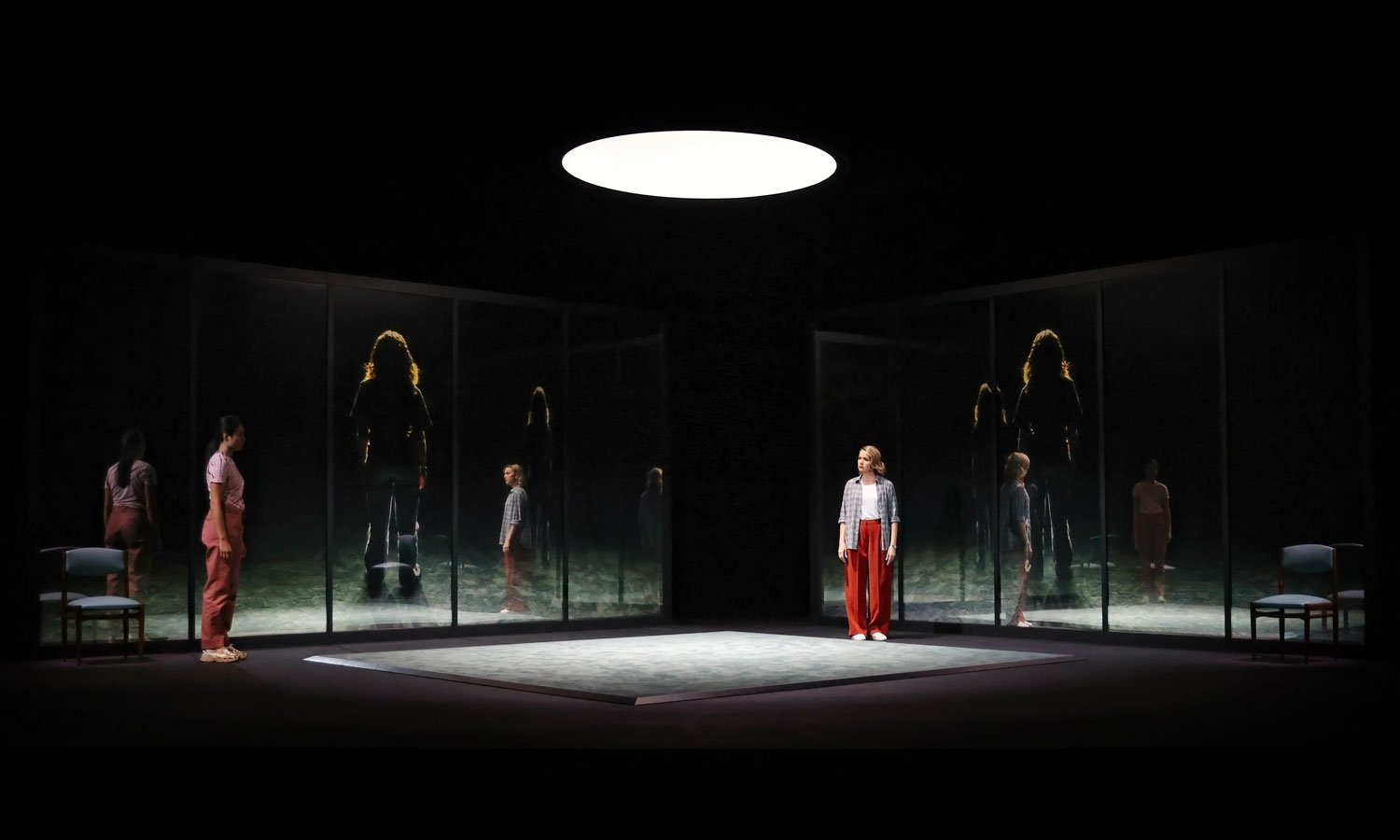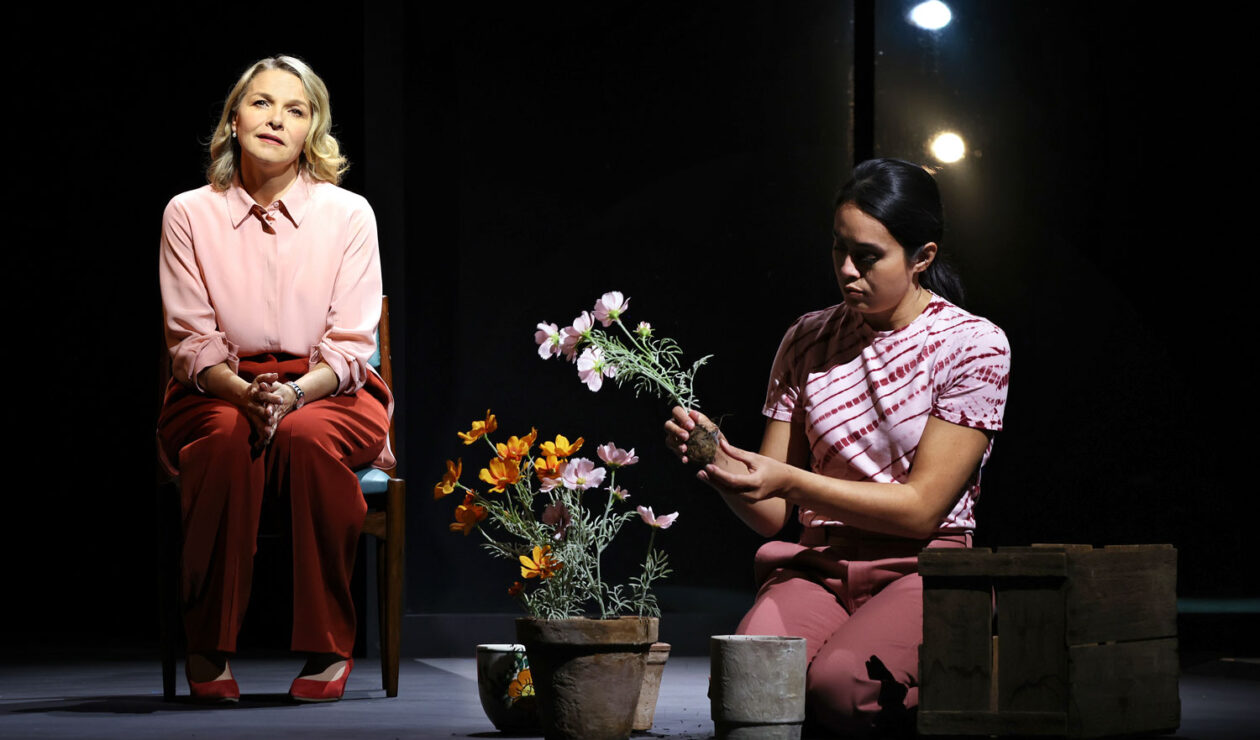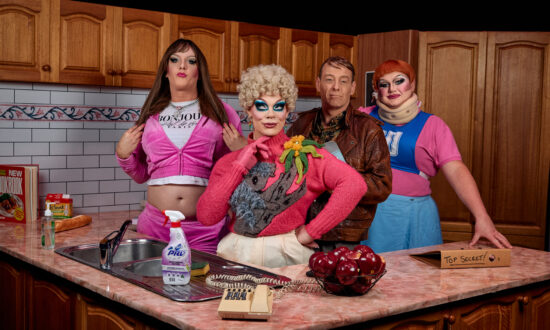The play opens with Question Time in Parliament House on October 9, 2012. Julia Gillard is about to stand up and deliver “the misogyny speech” – those minutes in which she distilled every slight, slur and slander she’d endured into a speech that sent shockwaves around the world. The moment is broken down and dissected – the layout of the room, the seating plan, the position of clocks on the wall and how much time she has left to speak.
Gillard (Justine Clarke) opens her mouth – “I will not…”. And with these three words the play swings to Wales in the 1960s and how these same words fortified the character of the small girl who would become the 27th prime minister of Australia.
Clarke is simply electrifying. She delivers 90 minutes of monologue without flaw, infusing this creative piece of biographical history with thoughtfulness and fire.
While primarily a solo piece, Clarke’s embodiment of Gillard is assisted and witnessed on stage by a Young Woman (Jessica Bentley) who morphs through various roles – a young Julia, Julia’s conscience, the women of Australia, and the expectations of future generations of Australian women. She is mostly silent, hovering at the edge of the action as she watches, looking on with hope, support and at times reproach.
Underpinning Clarke’s powerhouse performance is a superb script by one of Australia’s most internationally celebrated and widely performed playwrights. Joanna Murray-Smith’s writing often focuses on the lives of women and their struggles towards equality and Julia is no exception, elevating the art of theatrical biography to new heights.
Murray-Smith dug below the surface of historical fact to unearth fascinating details that work to illuminate Gillard’s character with deep insight, gorgeous language and a healthy dose of humour. This play is remarkably funny.
The humour is a blessing, since Julia also details with clinical precision the media, political and public backlash to Gillard’s appointment as prime minister. The empty fruit bowl. The jackets. Her hair and body shape. The questioning of her partner’s sexuality, and the denunciation of her worth as a leader because of her decision to remain “deliberately barren”. The script offers up every appalling insult and example of gendered disrespect. Without the humour, this evidence of misogyny entrenched within our media and parliament would be unbearable.

Justine Clarke’s embodiment of Julia Gillard is deeply empathetic. Photo: Prudence Upton
Director Sarah Goodes has guided this piece brilliantly, ensuring that the Julia Gillard we see on stage is a fully fleshed woman rather than the clichéd caricature the media served up to the public. This is cleverly achieved by resisting the temptation to slide into impersonation. Gillard’s distinctive voice is used only when quoting her directly. When those moments arrive, Clarke is flawless. She has a flair for impressions (her Tony Abbott smirk and John Howard bluster are highlights) and clearly could have delivered the entire 90 minutes as Gillard. But this restraint with the accent gives the audience valuable insight into which parts of the script are Gillard’s public performance and which are creative insights into her interior world.
Clarke plays every beat of this cleverly structured piece with perfect tone and precision, her embodiment of Gillard deeply empathetic as the play struggles to maintain the façade of biography rather than hagiography. And while Gillard’s flaws are not avoided, they aren’t given a great deal of airtime, restricted to a scene in which Clarke brilliantly evokes the former PM’s struggles with the cost to her conscience of certain policy decisions.
In the final scene, the play returns to those crucial minutes in the House of Assembly, Clarke delivering the now-famous speech, embodying the prime minister in hair, jacket, voice and gesture. Enriched with the full context of the gendered insults, double standards and rampant misogyny leading up to that moment, her words hit even harder.

Get InReview in your inbox – free each Saturday. Local arts and culture – covered.
Thanks for signing up to the InReview newsletter.
The standing ovation at the opening-night performance was well deserved. Julia is a clever, creative and deeply thoughtful insight into our nation’s first female prime minister – a woman who endured an onslaught of sexism and misogyny before unleashing her fury in a speech that has earned her a place as an Australian icon.
State Theatre Company South Australia, in association with the University of Adelaide, is presenting the Sydney Theatre Company and Canberra Theatre Centre production of Julia at the Dunstan Playhouse from August 16-31. Justine Clarke spoke about the process of inhabiting the life of Julia Gillard in this recent interview with InReview.
Support local arts journalism
Your support will help us continue the important work of InReview in publishing free professional journalism that celebrates, interrogates and amplifies arts and culture in South Australia.
Donate Here




